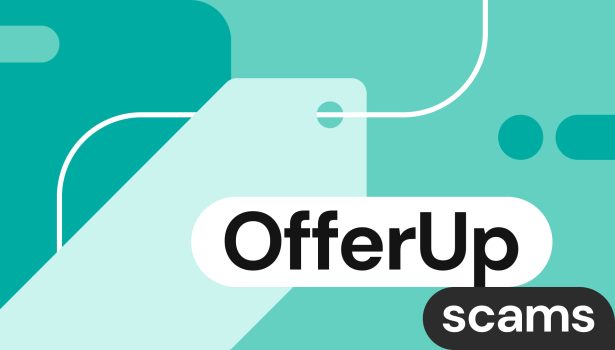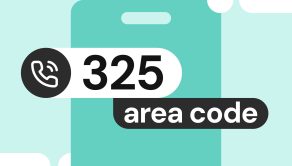OfferUp scams: a guide to staying safe as a seller or buyer

Buying and selling from someone you don’t know is always a matter of trust, but with the rise of social e-commerce marketplaces, it’s even more so.
OfferUp, in particular, has become a convenient alternative to Craigslist, with a focus on local, mobile-first shopping for pre-owned products. But if you’re considering jumping on the platform to buy, sell, or offer your services, you should learn how to detect and avoid potential scams.
Read on for the list of top OfferUp scams, their red flags, and safety tips that will make your time on OfferUp well-spent.
What is OfferUp and how does it work?
OfferUp is a popular U.S.-based, mobile-first marketplace for local buying, selling, and community networking. It was launched in 2011 as an alternative to Craigslist and eBay and has reached more than 150 million users since. In addition to social commerce features, it also lists jobs, local events, and apartment rentals.
Most OfferUp features are free, such as listing, buying, and selling items through local in-person meetups. Beyond these in-person exchanges, OfferUp can act as an end-to-end intermediary between buyers and sellers, with both payment and shipping enabled directly through the app as paid features. This provides much-needed purchase traceability and payment guarantees—the absence of which might enable scamming on other marketplaces, like Facebook Marketplace scams.
As for app mechanics, all the communication between buyers and sellers happens in the app. Interested buyers have the option to ask clarifying questions and make an offer with their suggested price. The seller can accept or reject the offer. If the offer is accepted for an item shipped through OfferUp, the buyer is charged the full price upfront, but the money is only released to the seller after the buyer receives the item and confirms there are no issues with the purchase.
Is OfferUp safe to use?
Yes, OfferUp is generally safe to use, and its multi-million user base is a testament to its safety. Yet, like on many similar online marketplaces, there are scammers on both the buying and selling sides. OfferUp also has a broader attack surface for scammers, as it features many high-demand and time-sensitive listing categories, such as open jobs, rentals, and services, in addition to used items for sale.
While the platform provides identity verification, buyer protection for OfferUp shipping sales, and traceability for such in-app purchases, sometimes using OfferUp is a gamble and depends on how vigilant you are. Still, OfferUp has a range of safety and security features:
- For user identity verification, OfferUp introduced their voluntary TruYou membership program, issuing verification badges to those who confirm their identity with a national ID. This reduces the risk of identity forging on the platform but doesn’t guarantee that the user is 100% reliable to transact with.
- OfferUp user profiles have ratings and reviews left by other users, so it’s possible to check a user’s credibility based on them.
- The platform offers a choice between free in-person transactions and paid in-app payment and shipping. For this, OfferUp partners with Stripe for payment processing and USPS for seamless nationwide shipping that can be tracked right in the app. This is not only convenient but also helps to curb potential OfferUp shipping scams (though they are still possible).
- While fee-free, in-person transactions are not as safe as when items are paid for and shipped through OfferUp. Recognizing this safety limitation, OfferUp provides local Community MeetUp Spots for local meetups in safe, well-lit areas under 24/7 video surveillance.
10 most common OfferUp scams
You can get scammed on OfferUp regardless of whether you buy or sell on the platform. Bad actors are everywhere, ready to trick you into sharing your personal information or sending them money or items for free under false pretenses.
Here’s the list of top OfferUp scams that you should learn to recognize and avoid:
Buyer scams on OfferUp
Overpayment and chargeback scams
These common scams involve a bad actor posing as a buyer and intentionally overpaying for the item using an off-the-platform payment method. Then, they request the seller to refund them the difference—or even the entire amount— to correct the “mistake,” while their original payment later bounces due to a chargeback or the use of stolen funds. The seller is left with a net loss.
Fake payment confirmations
Fake buyers on OfferUp may persuade a seller to accept and ship the item outside of OfferUp. This allows them to trick the seller with a fake payment confirmation and get the item essentially for free. Remember, screenshots don’t qualify as payment confirmation unless the payment is actually reflected in your account balance.
Identity verification scams
These scams often involve “buyers” sending sellers links to “verify” their identity to ensure they’re dealing with a real person. These are phishing links designed to steal login credentials and other sensitive information. Fake buyers can also request your OfferUp verification code under the pretense of confirming your identity, but in reality, they use this code to take over your OfferUp account.
Never share your OfferUp verification codes with anyone. There’s no legitimate reason for another user to ask for this code—doing so is a clear red flag for a scam as scammers need this code to hijack your account.
Email phishing scams
Fake buyers may also ask you to send them more photos of the item to their email address, then use your email for malicious purposes, such as selling it on the dark web or targeting you with phishing emails later.
Seller scams on OfferUp
To carry out OfferUp seller scams, scammers can hijack existing accounts with real history and reviews or operate from clean profiles. Not all new profiles are suspicious, but those with lots of fresh high-value listings often are.
Fake listings
Fake listings are common in categories such as jobs, rentals, and rare or high-demand items like electronics. These listings are simply bait to catch unaware users and make them pay for items that don’t exist. In these cases, scammers typically ask buyers to move off the platform and use instant money transfers which offer little to no buyer protection, for example, to carry out their Zelle scams or steal your funds via Venmo.
Shipping scams
Shipping scams on OfferUp vary. A seller may offer a different shipping service, such as FedEx or UPS, and send the buyer a fake invoice to cover shipping fees. This invoice link may also be a phishing attempt that leads to a form designed to steal the buyer’s payment data.
Bad actors can also trick you into shipping outside the platform as such purchases won’t be covered by OfferUp’s buyer protection, and send a counterfeit or completely useless item instead of what was ordered.
Empty box scams
This is a variation of the bait-and-switch OfferUp shipping scam, where a fake seller sends an empty box instead of the actual item. The scammer may avoid responsibility by using a third-party shipping service rather than OfferUp’s official one or by deleting their profile immediately afterward.
Counterfeit items
Counterfeit goods may look like the genuine ones but are actually knock-offs. These are common in such categories as luxury bags, accessories, and electronics. Unlike Poshmark that prevents counterfeit scams with their luxury authentication service, OfferUp doesn’t have one so buyers must rely on their own judgment to ensure an item is authentic.
Counterfeits can be difficult to dispute and may even be dangerous to use. Always buy expensive items through OfferUp’s official shipping to ensure you’re covered by their buyer protection.
Deposit scams
Scammers may post fake listings of apartment rentals or expensive, high-demand items, then ask for an upfront deposit to reserve the item. Claiming that many buyers are interested, they pressure you to act quickly and transfer the deposit via an instant money service—then disappear. In reality, this item might have never existed in the first place.
When buying on OfferUp, never make any upfront payment unless you’ve seen and inspected the item. Alternatively, choose OfferUp’s shipping so the purchase is covered by their buyer protection.
Phishing scams
Scammers on the seller side use various convincing tactics to send buyers phishing links to spoofed websites, often imitating third-party payment services or OfferUp’s official web pages. These spoofed pages are used to collect sensitive personal and payment information, which scammers can then use to access funds or steal the buyer’s identity.
Never click on links sent by sellers on OfferUp, as you can’t verify their legitimacy. The marketplace provides all necessary features within its official app to enable the transaction, so be wary of sellers pushing you to visit other websites for any reason.
How to spot a scam on OfferUp
Spotting an OfferUp scam becomes easier when you know what to look out for. Here are the top red flags that reveal fake sellers and buyers on the marketplace:
- Requesting to move the transaction off the platform. In this case, the scammer benefits from the lack of buyer protection and other safety provisions.
- Unrealistic prices that are too good to be true. This applies to both sellers who price their items too cheaply and buyers who make offers far exceeding the asking price.
- Poor-quality images or stock photos. In case of doubt, reverse-search the image to make sure it’s not stolen from elsewhere.
- Request to pay with a gift card or cryptocurrency. Scammers love instant, irreversible payment methods, so be wary of using them.
- Request for sensitive information that isn’t essential to the transaction, like your credit card information, home address, email, or phone number.
- Asking to send more photos via email so they can gain access to your email address for further scams.
- Sending you links to payment pages or “identity verification” forms, as these are likely phishing sites.
- Suspicious communication,such as sketchy item descriptions, cryptic and vague messages, or cookie-cutter responses to listings that may disguise an automated scam bot.
- Asking for a deposit before you can see the item.
- Rushed or aggressive behavior, with users pushing you to act right now.
How to protect yourself from OfferUp scams
OfferUp provides two-day buyer protection for items shipped through the platform. However, there’s no protection if the transaction and shipping happen outside OfferUp, such as through in-person meetings or third-party services.
It’s recommended to always stay on OfferUp and avoid moving your communication to another platform. However, if you do agree to handle a purchase off the platform—such as meeting locally and paying in cash—take note of the following safe practices:
- Always check seller reviews and other listings, if available. Some fake sellers post dozens of similar listings using stolen or stock photos.
- You can ask for more photos or details of the item before committing. If the item is not real, the seller will likely hesitate to provide them.
- Don’t click on any links sent by strangers, as they may lead to spoofed websites designed to steal your personal information or install malware.
- For in-person deals, never send any payments before seeing the item and confirming that it works.
- Don’t use instant money transfer services like Venmo or Zelle, as they offer no scam protection and transactions are irreversible.
- Never accept screenshots as payment confirmations. Always check your actual balance and wait for the payment to clear before confirming the purchase.
- If meeting locally, choose a Community Meetup Spot approved by OfferUp for a safer experience.
- Leave your honest feedback after the transaction, or report the user if you have any issues along the way.
What to do if you get scammed on OfferUp
In an unfortunate case of being scammed on OfferUp, you might get your money back if you opted for shipping via OfferUp and are not satisfied with the delivered item.
In this case, you should first request a refund directly from the seller. If the issue cannot be resolved with them, file a claim with OfferUp within two days of receiving the item. You may be refunded if you didn’t receive the item, it’s damaged, differs from the description, is incorrect, or has missing parts. If your claim is approved, you will need to return the item to the seller using the return label provided by OfferUp.
Alternatively, if your purchase isn’t shipped within five days of the purchase, the deal is automatically cancelled and the full amount is refunded.
In all cases, whether the transaction was handled by OfferUp or not, do the following:
- Report the scam to OfferUp.You can report both the listing and the user profile. Have evidence of what happened ready, and contact OfferUp’s official support for assistance.
- If you shared any financial information, for example mistakenly sharing your login credentials in a Cash App scam, contact your bank and/or change the passwords for the digital services affected. Additionally, consider blocking and reissuing your affected payment card(s).
- If you shared any personally identifiable information, such as your Social Security Number, report the scam to the Federal Trade Commission and the Internet Crime Complaint Center.
- Scan data broker sites with Onerep for traces of your stolen information available publicly. This will help to minimize the risk of future scams targeting you.
FAQs:
Can you get scammed on OfferUp?
Yes, you can get scammed on OfferUp. There are known cases of scams involving both buyers and sellers, so it’s crucial to stay vigilant and avoid handling transactions off the marketplace.
Does OfferUp have buyer protection?
Yes, OfferUp offers two-day buyer protection for items that are paid for and shipped through OfferUp’s services.
What happens if you get scammed on OfferUp?
If you get scammed on OfferUp, scammers can steal your money, trick you into sending items for free, or steal and misuse your personal and financial information, such as account credentials and credit card data.
How to report a scam on OfferUp?
You can report a scam using OfferUp’s Report feature available on both user profiles and listings. You can also block the user and contact OfferUp customer support directly to explain your case.





Dimitri is a tech entrepreneur and founder of Onerep, the first fully automated data removal service. Top cybersecurity CEO of 2021 by The Software Report.